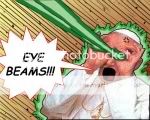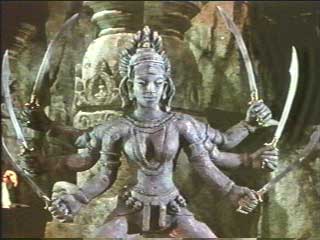Whodunit? Who Murdered the Money Man: The Mafia? The Vatican? Or Both?
Why Was 'God's Banker' Killed?
from Toronto Star
LONDON - Even the Pope couldn't help "God's banker."
Roberto Calvi , an Italian financier with ties both to the Vatican — hence his nickname — and the Mafia, in 1982 begged John Paul II to step in and save his bank from collapse, The Times of London reports. But money was the least of Calvi's problems.
, an Italian financier with ties both to the Vatican — hence his nickname — and the Mafia, in 1982 begged John Paul II to step in and save his bank from collapse, The Times of London reports. But money was the least of Calvi's problems.
Two weeks later, on June 19, he was found hanging by an orange rope tied in a lover's knot from scaffolding under Blackfriars Bridge, [which] spans the River Thames.
It was one of the showier crimes of the 20th century, originally ruled a suicide but revealed two years ago to be homicide, with all the ingredients of a good whodunit — organized crime, financial scandal, money laundering for the Mafia and the Vatican, and chicanery in the most confidential corridors of religious power and the equally secret affairs of freemasonry.
It also never has been explained how someone could suspend a corpse in such a prominent place without being noticed. There were two British inquests into his death. Calvi's pockets were stuffed with bricks, apparently to weigh down his body, and cash. He was carrying a forged passport. Forensic scientists said the absence of dirt on his hands and brick dust under his fingernails showed he had not touched the bricks or climbed the scaffolding. They concluded his throat injuries indicated strangulation, not hanging.
Almost a quarter of a century later, that little mystery might be solved as the trial began in Rome for the five accused killers of Calvi, 62. They are: Pippo "the Cashier" Calo, a Sicilian Mafia chieftain; businessmen Flavio Carboni and Ernesto Diotallevi; Carboni's ex-girlfriend; and Calvi's bodyguard.
The prosecution will argue the accused lured Calvi to London to kill him after he held onto millions of dollars he was laundering for the Mafia and also stole from financier Licio Gelli, head of the illegal Masonic lodge, P2. Calvi was a member along with top politicians, businessmen and military officers.
The defence, sticking to the original finding of suicide, is expected to embarrass the Roman Catholic church by calling former Vatican officials to testify.
Among those anxious to see justice finally done are Calvi's widow Carla and son Carlo, a Montreal banker. They believe he was the victim of a well-disguised Cosa Nostra hit to cover up the Vatican Bank's involvement with the Mafia.
Family members could not be reached yesterday but Carlo Calvi, 51, has told the British Broadcasting Corp. "I believe the killers were sending a message by killing him in public in the heart of the city. There was definitely something theatrical about it all, and the message was clearly worth the risk."
He dismisses popular theories that Blackfriars Bridge and the way the body was hung were Masonic symbols. (P2 lodge members are said to wear black robes and call each other `friar.' Bricks are a mason's material. Initiates reportedly are told betraying its secrets brings death by hanging and tides to wash the corpse.) "But I do believe...the way he was killed was symbolic."
A new book on the case, Poteri Forti (Powerful Forces) by Ferruccio Pinotti, includes a letter to the Pope which Pinotti says the Calvi family gave him: "I have thought a lot, Holiness, and have concluded that you are my last hope," it says.
new book on the case, Poteri Forti (Powerful Forces) by Ferruccio Pinotti, includes a letter to the Pope which Pinotti says the Calvi family gave him: "I have thought a lot, Holiness, and have concluded that you are my last hope," it says.
Calvi reportedly reminded John Paul that he had funded political and religious groups supported by the Vatican in both eastern and western Europe and had set up banks in Latin America to help combat the spread of communism. He warned the Pope that if [his bank] Banco Ambrosiano went under [which it did], it would "provoke a catastrophe of unimaginable proportions in which the Church will suffer the gravest damage."
His bank was owed huge sums of money by Panamanian companies involved with the Vatican Bank. The Vatican later paid out a quarter of a billion dollars to Ambrosiano creditors, denying legal responsibility but admitting "moral involvement."
Calvi also had warnings for the pontiff himself — that Vatican fiscal shenanigans were being kept from him and that Calvi's enemies within the church hierarchy were also conspiring against John Paul.
Carlo Calvi has claimed parallels between the murder and the 1981 assassination attempt against the Pope of 1981. There was a power struggle within the Vatican, in which his father was caught up. "It wasn't obvious that the Pope was going to be in the winning position..."
He told the Toronto Star in 1998: "My father had many enemies within the Vatican."
from Toronto Star
LONDON - Even the Pope couldn't help "God's banker."
Roberto Calvi
 , an Italian financier with ties both to the Vatican — hence his nickname — and the Mafia, in 1982 begged John Paul II to step in and save his bank from collapse, The Times of London reports. But money was the least of Calvi's problems.
, an Italian financier with ties both to the Vatican — hence his nickname — and the Mafia, in 1982 begged John Paul II to step in and save his bank from collapse, The Times of London reports. But money was the least of Calvi's problems.Two weeks later, on June 19, he was found hanging by an orange rope tied in a lover's knot from scaffolding under Blackfriars Bridge, [which] spans the River Thames.
It was one of the showier crimes of the 20th century, originally ruled a suicide but revealed two years ago to be homicide, with all the ingredients of a good whodunit — organized crime, financial scandal, money laundering for the Mafia and the Vatican, and chicanery in the most confidential corridors of religious power and the equally secret affairs of freemasonry.
It also never has been explained how someone could suspend a corpse in such a prominent place without being noticed. There were two British inquests into his death. Calvi's pockets were stuffed with bricks, apparently to weigh down his body, and cash. He was carrying a forged passport. Forensic scientists said the absence of dirt on his hands and brick dust under his fingernails showed he had not touched the bricks or climbed the scaffolding. They concluded his throat injuries indicated strangulation, not hanging.
Almost a quarter of a century later, that little mystery might be solved as the trial began in Rome for the five accused killers of Calvi, 62. They are: Pippo "the Cashier" Calo, a Sicilian Mafia chieftain; businessmen Flavio Carboni and Ernesto Diotallevi; Carboni's ex-girlfriend; and Calvi's bodyguard.
The prosecution will argue the accused lured Calvi to London to kill him after he held onto millions of dollars he was laundering for the Mafia and also stole from financier Licio Gelli, head of the illegal Masonic lodge, P2. Calvi was a member along with top politicians, businessmen and military officers.
The defence, sticking to the original finding of suicide, is expected to embarrass the Roman Catholic church by calling former Vatican officials to testify.
Among those anxious to see justice finally done are Calvi's widow Carla and son Carlo, a Montreal banker. They believe he was the victim of a well-disguised Cosa Nostra hit to cover up the Vatican Bank's involvement with the Mafia.
Family members could not be reached yesterday but Carlo Calvi, 51, has told the British Broadcasting Corp. "I believe the killers were sending a message by killing him in public in the heart of the city. There was definitely something theatrical about it all, and the message was clearly worth the risk."
He dismisses popular theories that Blackfriars Bridge and the way the body was hung were Masonic symbols. (P2 lodge members are said to wear black robes and call each other `friar.' Bricks are a mason's material. Initiates reportedly are told betraying its secrets brings death by hanging and tides to wash the corpse.) "But I do believe...the way he was killed was symbolic."
A
Calvi reportedly reminded John Paul that he had funded political and religious groups supported by the Vatican in both eastern and western Europe and had set up banks in Latin America to help combat the spread of communism. He warned the Pope that if [his bank] Banco Ambrosiano went under [which it did], it would "provoke a catastrophe of unimaginable proportions in which the Church will suffer the gravest damage."
His bank was owed huge sums of money by Panamanian companies involved with the Vatican Bank. The Vatican later paid out a quarter of a billion dollars to Ambrosiano creditors, denying legal responsibility but admitting "moral involvement."
Calvi also had warnings for the pontiff himself — that Vatican fiscal shenanigans were being kept from him and that Calvi's enemies within the church hierarchy were also conspiring against John Paul.
Carlo Calvi has claimed parallels between the murder and the 1981 assassination attempt against the Pope of 1981. There was a power struggle within the Vatican, in which his father was caught up. "It wasn't obvious that the Pope was going to be in the winning position..."
He told the Toronto Star in 1998: "My father had many enemies within the Vatican."




























0 Comments:
Post a Comment
<< Home